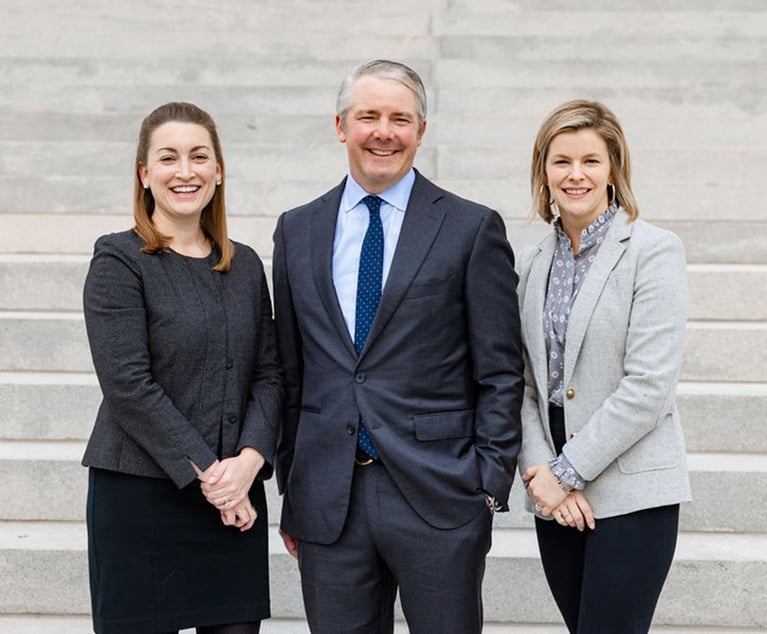 U.S. District Judge Emmet Sullivan of the District of Columbia. Photo by Diego M. Radzinschi/NATIONAL LAW JOURNAL
U.S. District Judge Emmet Sullivan of the District of Columbia. Photo by Diego M. Radzinschi/NATIONAL LAW JOURNALWho Is Emmet Sullivan, the Judge Who Will Sentence Michael Flynn?
U.S. District Judge Emmet Sullivan made headlines recently when he ordered the U.S. government to turn around a plane that was carrying a woman whose asylum case was still pending in court. Here's a lot more to know about the judge.
December 17, 2018 at 03:24 PM
6 minute read
U.S. District Judge Emmet Sullivan in Washington will return to the national spotlight Tuesday when he sentences Michael Flynn, a former lieutenant general who briefly served as President Donald Trump's national security adviser, for lying to federal investigators in their probe into Russian interference in the 2016 U.S. election.
Sullivan, a Clinton appointee to the U.S. District Court for the District of Columbia, will decide whether Flynn goes to prison. Flynn's defense attorneys from Covington & Burling and prosecutors working under special counsel Robert Mueller III have both recommended a sentence without jail time, citing Flynn's extensive and timely cooperation with the government.
Sullivan previously served on the District of Columbia Superior Court as an appointee of President Ronald Reagan, and he later served on the D.C. Court of Appeals, the District of Columbia's top appellate court, under President George H.W. Bush.
His tenure has been marked by occasionally colorful commentaries on the conduct of government lawyers and criticism of prosecutors for reaching corporate settlements that are not accompanied by prosecutions of individuals. In a quarter century on the bench, Sullivan has routinely drawn high-profile cases, among them the Justice Department's mishandled prosecution of former U.S. Sen. Ted Stevens and the government's successful challenge in 2016 to Staples' proposed takeover of Office Depot.
What follows are things to know about Sullivan:
➤➤ “Turn that plane around.” Sullivan made headlines in August when he learned that a mother and daughter had been “spirited away” by airplane while their asylum case was pending before him. Calling the move “outrageous,” Sullivan ordered the government “to turn that plane around either now or when it lands.” He added: “Turn that plane around and bring those people back to the United States.” Prosecutors said they understood Sullivan's frustration and promised to comply with his order. Later in August, in a separate asylum case, Sullivan told Justice Department lawyer Erez Reuveni that he appreciated his “professionalism” and his efforts to “undo the wrong” committed against the mother and daughter.
➤➤ Sullivan has often criticized white-collar prosecutions that don't include charges against individual executives. In August 2010, before signing off on a $298 million deferred-prosecution agreement resolving claims that Barclays PLC hid the source of funds moving into the United States from sanctioned countries, Sullivan pressed prosecutors on why no executives were facing charges. “No one goes to jail, no one is indicted, no individuals are mentioned as far as I can determine,” Sullivan said. “There's no personal responsibility.” Sullivan praised Justice Department guidance encouraging prosecutors to pursue individuals behind corporate misconduct. “From one who has often criticized deferred-prosecution agreements for corporations as sweetheart deals that essentially require stockholders to pay the criminal fines for individuals who are criminally culpable, I applaud the new policies,” Sullivan told The National Law Journal in 2015.
Later that year, he delivered harsh criticism of the Justice Department's $900 million settlement with General Motors resolving claims that the carmaker concealed information about a deadly safety defect in its vehicles from U.S. regulators. GM's deferred prosecution agreement with the government, he said, provided “a shocking example of potentially culpable individuals not being criminally charged.”
➤➤ Sullivan's keenly aware of prosecution ethics. Sullivan, about a decade ago, was the trial judge assigned to the Ted Stevens public-corruption case. Sullivan sharply rebuked the government several times in that legal saga, railing against Justice Department lawyers for failing to timely disclose potentially exculpatory evidence to Stevens' defense lawyers at Williams & Connolly. He later named a special prosecutor to probe the prosecutors' errors, saying: “In 25 years on the bench, I have never seen anything approaching the mishandling and misconduct that I have seen in this case.”
The Stevens case proved instructive for Sullivan. He wrote in a 2017 Wall Street Journal column that he now issues what are known as “Brady” orders in criminal cases. These orders inform prosecutors of their legal and ethical responsibilities, and their obligation to seek out and provide, in a timely fashion, any potentially exculpatory evidence to the defense.
“This reminds the prosecutors who appear before me exactly what is required of them, and it ensures that any who intentionally withhold evidence can be held accountable,” Sullivan wrote in the Journal op-ed. Sullivan said he's encouraged fellow judges to adopt the same practice, including urging an advisory committee on criminal procedure rules to offer up an amendment that would require such disclosures.
➤➤ Sullivan's docket includes another legal thorn in the Trump administration's side: A lawsuit, brought by Democratic lawmakers, who allege the president's continued interest in his Washington hotel runs afoul of the Constitution's emoluments clause, which prohibits the president and other government officials from receiving gifts from foreign countries. Sullivan gave the lawsuit an important boost in September, when he turned down a Justice Department effort to dismiss the case on standing grounds.
In the months leading up to Trump's election, Sullivan oversaw the Federal Trade Commission's challenge to Staples' proposed acquisition of Office Depot. Sullivan agreed to block the deal, ruling that the FTC had shown there was a “reasonable probability” that the combination of the two rival chains would drive up prices for large corporations that buy office supplies in bulk. The proposed “merger will substantially impair competition in the sale and distribution of consumable office supplies to large Business-to-Business customers,” Sullivan wrote in his May 2016 order.
|Read more:
This content has been archived. It is available through our partners, LexisNexis® and Bloomberg Law.
To view this content, please continue to their sites.
Not a Lexis Subscriber?
Subscribe Now
Not a Bloomberg Law Subscriber?
Subscribe Now
NOT FOR REPRINT
© 2025 ALM Global, LLC, All Rights Reserved. Request academic re-use from www.copyright.com. All other uses, submit a request to [email protected]. For more information visit Asset & Logo Licensing.
You Might Like
View All
‘Issue of First Impression’: New York Judge Clears Coinbase Appeal Amid Crypto Regulatory Clash
4 minute read
DC's Birchstone Moore Combines With Chicago-Founded Wealth Planning Firm
3 minute read

Trending Stories
Who Got The Work
Michael G. Bongiorno, Andrew Scott Dulberg and Elizabeth E. Driscoll from Wilmer Cutler Pickering Hale and Dorr have stepped in to represent Symbotic Inc., an A.I.-enabled technology platform that focuses on increasing supply chain efficiency, and other defendants in a pending shareholder derivative lawsuit. The case, filed Oct. 2 in Massachusetts District Court by the Brown Law Firm on behalf of Stephen Austen, accuses certain officers and directors of misleading investors in regard to Symbotic's potential for margin growth by failing to disclose that the company was not equipped to timely deploy its systems or manage expenses through project delays. The case, assigned to U.S. District Judge Nathaniel M. Gorton, is 1:24-cv-12522, Austen v. Cohen et al.
Who Got The Work
Edmund Polubinski and Marie Killmond of Davis Polk & Wardwell have entered appearances for data platform software development company MongoDB and other defendants in a pending shareholder derivative lawsuit. The action, filed Oct. 7 in New York Southern District Court by the Brown Law Firm, accuses the company's directors and/or officers of falsely expressing confidence in the company’s restructuring of its sales incentive plan and downplaying the severity of decreases in its upfront commitments. The case is 1:24-cv-07594, Roy v. Ittycheria et al.
Who Got The Work
Amy O. Bruchs and Kurt F. Ellison of Michael Best & Friedrich have entered appearances for Epic Systems Corp. in a pending employment discrimination lawsuit. The suit was filed Sept. 7 in Wisconsin Western District Court by Levine Eisberner LLC and Siri & Glimstad on behalf of a project manager who claims that he was wrongfully terminated after applying for a religious exemption to the defendant's COVID-19 vaccine mandate. The case, assigned to U.S. Magistrate Judge Anita Marie Boor, is 3:24-cv-00630, Secker, Nathan v. Epic Systems Corporation.
Who Got The Work
David X. Sullivan, Thomas J. Finn and Gregory A. Hall from McCarter & English have entered appearances for Sunrun Installation Services in a pending civil rights lawsuit. The complaint was filed Sept. 4 in Connecticut District Court by attorney Robert M. Berke on behalf of former employee George Edward Steins, who was arrested and charged with employing an unregistered home improvement salesperson. The complaint alleges that had Sunrun informed the Connecticut Department of Consumer Protection that the plaintiff's employment had ended in 2017 and that he no longer held Sunrun's home improvement contractor license, he would not have been hit with charges, which were dismissed in May 2024. The case, assigned to U.S. District Judge Jeffrey A. Meyer, is 3:24-cv-01423, Steins v. Sunrun, Inc. et al.
Who Got The Work
Greenberg Traurig shareholder Joshua L. Raskin has entered an appearance for boohoo.com UK Ltd. in a pending patent infringement lawsuit. The suit, filed Sept. 3 in Texas Eastern District Court by Rozier Hardt McDonough on behalf of Alto Dynamics, asserts five patents related to an online shopping platform. The case, assigned to U.S. District Judge Rodney Gilstrap, is 2:24-cv-00719, Alto Dynamics, LLC v. boohoo.com UK Limited.
Featured Firms
Law Offices of Gary Martin Hays & Associates, P.C.
(470) 294-1674
Law Offices of Mark E. Salomone
(857) 444-6468
Smith & Hassler
(713) 739-1250










